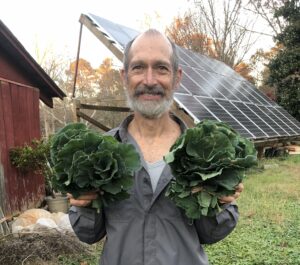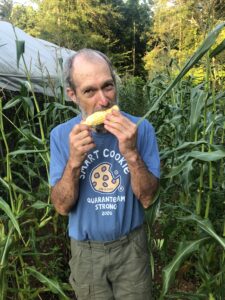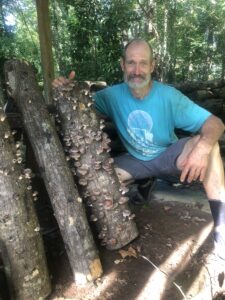Crager Hager Farm - Sharing Insight on USDA’s Organic Certification Cost Share Program

Organic farmer and OFRF Board Chair Bryan Hager is aware of about natural farming and the method it takes to get licensed. Hager and his spouse Wendy personal Crager Hager Farm, a diversified fruit and vegetable farm in Carroll County, Georgia. Their farm is a year-round operation that grows salad and cooking greens corresponding to lettuce and spinach, and fashionable market gadgets corresponding to tomatoes, beans, squash, and cucumbers. Crager Hager Farm additionally grows apples, pears, and heirloom strawberries and blueberries. In whole, the farm grows 120 kinds of vegetable and fruit crops.
Hager has been concerned in farming most of his life, utilizing natural practices since he was 16 years outdated. He began rising and promoting for market in 2001 and authorized natural in 2017. It was presently that Hager first participated within the USDA’s Organic Certification Cost Share Program (OCCSP). This vital program gives reimbursement for agricultural producers and handlers who're acquiring or renewing their natural certification underneath the National Organic Program (NOP).

To take part in this system, eligible operations should submit their OCCSP purposes to State businesses or to their native Farm Service Agency (FSA) county places of work. Crager Hager Farms took the latter method and was the primary operation of their county to use for this program. Together, Crager Hager Farm and FSA navigated the applying. The subsequent two years went effectively, however since then, the method has taken longer and longer to finish with reimbursement funds extraordinarily delayed.
When Crager Hager Farms first utilized to the fee share program, the USDA supplied as much as $750 in reimbursements which lined roughly 75% of the farm’s certification charges. Since then, the quantity for Crager Hager Farm to certify natural has almost doubled, although the OCCSP has diminished their price share to $500.
For Crager Hager Farm, the monetary and time prices of natural certification maintain rising whereas the farm is getting smaller. The farm beforehand supplied an internship program and employed 5 full-time workers in peak season. Over the final two years, the farm has scaled again their operations. Currently, they attend one farmers market and worker one part-time farm worker. The burdensome price of certification and diminished funding from the fee share program
has had its impact on Crager Hager Farm.

Though the operational resolution to downsize displays a private curiosity for Hager and his spouse to take a position their time elsewhere, Hager admits that working a farm has develop into more and more extra irritating. “Every year, there seems to be a new requirement to get certification,” says Hager. “The ‘time-cost’ and financial cost continues to go up on top of the problems with climate and changing markets. The increasing complexity of certification adds a lot of stress to being a farmer.”
Crager Hager Farm has dropped their USDA natural certification, although they nonetheless observe the identical methods that assist enhance soil fertility and develop nutritious produce freed from artificial inputs. “We’ve been committed to growing organically for 40 years, well before we got certified,” says Hager. They are an natural pioneer of their state and have a robust status at farmers markets that’s been cultivated over time.
Today, Hager plans to rejoin the Certified Naturally Grown (CNG) program, an unbiased grassroots initiative providing peer-review certification to farmers. More than 750 farmers and beekeepers take part within the CNG certification all through the United States and Canada, although the USDA doesn't supply any price share incentives for this course of.
And though Crager Hager Farm has encountered points with the Organic Certification Cost Share Program, Hager says, “If someone is considering getting certified, they should definitely look into the program as it can reduce some of the financial burden.”
